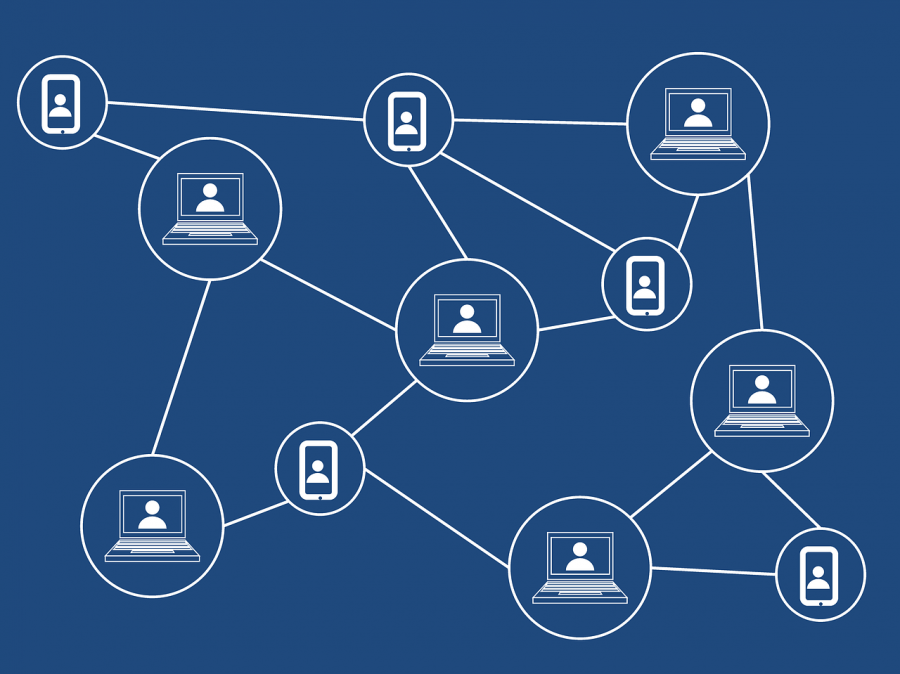Blockchain’s Role in Battling the Novel Coronavirus
TUMISU VIA PIXABAY
As the effects of the Coronavirus pandemic increase Americans’ reliance on technology, privacy becomes a relic of the past through Blockchain.
April 7, 2020
Blockchain is on the path to take a central role amid the instruments used to combat the novel coronavirus and defeat the pandemic. While this technology is already supporting our supply chains and validating information, it might also provide a solution for the trade-off between private data and public health care.
First, what is blockchain technology? In simple terms, it is a distributed, decentralized open ledger that permanently holds immutable records of transactions. It may be the most highly controversial new technology of the 21st century.
Now, blockchain has entered the colosseum’s arena of potential fighters against the novel coronavirus.
Through its structure consisting of blocks and chains, blockchain holds many unique advantages that form the foundation of its pervading path of entire industries. Among others, the benefits include the elimination of the middle man, reduction of operation costs, transparency, improved traceability, increased efficiency, enhanced security, empowered users and accelerated transactions. Due to its decentralized nature, it does not need a central authority.
In light of the coronavirus, blockchain technology already secures supply chains, validates information, disrupts corrupted systems and censorship and offers support for social distancing. Additionally, it might also secure anonymized personal information in the hunt for data triggered by the pandemic.
Securing of supply chains
One of the most immediate applications of blockchain is in the supply chain industry. The severe implications of this pandemic such as the domino effect induced collapse of supply and demand systems, labor shortages and early signs of protectionism, cause severe disruptions in global supply chains. In a newly issued report of the World Economic Forum, the need for the application of blockchain to resilient the supply chains is highlighted.
Private blockchain networks provide for transparency as well as traceability. In private blockchains, only the owner of that respective blockchain decides who is allowed to join the network. It uses distributed ledger technology (DLT) secured by cryptography (a method to secure communication via a code) as opposed to being decentralized like in a public blockchain. The distributed ledger is a consensually shared and synchronized dataset across numerous sites (nodes), allowing for transactions to have public witnesses.
The blockchain based supply chain solution Theseus by the Canadian tech company Emerge, issues not only digital certificates of the product’s origin and quality control but also registers the exports with the right authorities, allowing for a near-real time visibility into the product’s path. The Netherlands operate a blockchain platform by the company Tymlez to prevent predatory value extraction of medical goods. Similarly, the Chinese tech company Alipay and the Zhejiang Provincial Health Commission and the Economy and Information Technology Department use a blockchain-based platform to trace the demand and supply of medical supplies such as protection gears. Hence, blockchain eliminates the wild west like scenes currently occurring on the medical supply market for the coronavirus.
Verification of information
Moreover, blockchain enables the verification of information.
As fake news and misinformation are on the rise, the technology helps to shed light on the flood of information. Slowly but surely blockchain-based platforms emerge to tackle the media’s transparency and accuracy issue in light of the coronavirus. The Trusted Voices platform by Emerge utilizes blockchain to track source material. The World Health Organization, together with IBM, Oracle and more, will deploy MiPasa, an open-data hub applying blockchain, to check the veracity and inconsistencies of data.
Blockchain further ensures the continuity of government services. The United Arab Emirates’ Ministry of Community Development operates blockchain-based systems to provide for digital identities. Thus, users do not need to leave their homes while still having access to essential services such as the digital authentication of official certificates.
Additionally, fundraisers and donations are improved via blockchain. The blockchain-based donation tracking platform by Hyperchain and the Xiong’an Group enables authenticated donations of face masks, medical equipment and money to support hospitals in central China. The Italian Red Cross and the Colli Albani Committee started a campaign to raise donations of blockchain backed cryptocurrencies such as Bitcoin to combat COVID-19. Likewise, the Dutch and American Red Cross accept cryptocurrencies as donations. Even, in Venezuela, President Maduro will airdrop one Petro, the country’s government issued cryptocurrency, to each doctor. Still, the potential for cross-border donations in regard to the coronavirus is ready to be tapped into. The blockchain-based computing platform introduced by the United Nations World Food Program functions as a blueprint for a global coronavirus fundraiser. This will be particularly important as more developing countries start to drown from the implications of this pandemic.
Furthermore, blockchain provides for accelerated executions of financial claims. Small- and medium-sized enterprises in China, already utilize Ant Financial’s blockchain-powered platform to apply for bank loans. Correspondingly, Chinese insurance companies are starting to implement blockchain platforms to faster track coronavirus claims. Also the Chinese mutual aid platform Xiang Hu Bao operates on blockchain. Even though it is not an insurance company, it provides for one-time coronavirus payouts.
While not in use yet, the distributed ledger technology (DLT) could add credibility to government promised relief payments in the future. Publicly verifiable smart contracts are able to secure government commitment. As soon as the conditions are met for the relief to be paid, the smart contract is engaged, activating the automated payment. Smart contracts are self-executing computer protocols using the terms of the agreement. They allow for trackable and irreversible transactions. The second layer of protection provided by DLT is distributed consensus, ensuring a consensus of data among the nodes. This technology could also ensure that companies are complying to the requirements set forth in the U.S. relief bill.
Disruption of corruption and censorship
Blockchain hinders corrupt systems and government induced censorship.
In Honduras, a country discredited for retaining a corrupt health care system, citizens use a blockchain-based app called Civitas developed by Emerge. The app assigns people’s government ID numbers a unique blockchain record. In order to lessen gatherings in small places which respectively decrease the probability of contagion, it allocates customer’s store access times. Furthermore, the app also provides for validated telemedicine as well as generates permits which allow Hondurans to leave their house without having to fear corruption.
Citizens that face censorship by oppressive regimes, will find remedy in blockchain. Cryptography and decentralized domains hinder governmental efforts to silence information. The Chinese journalist Sarah Zheng shared an interview with a doctor from Wuhan about the coronavirus on the Ethereum network, a decentralized blockchain-based distributed computing platform, despite the alleged censorship.
Support for social distancing
Blockchain contributes to social distancing. As 90 countries are calling for compulsory or mandatory confinements, over 3.9 billion people asked to stay home. However, not all who now have to work or study from home have internet access. In rural America for instance, 39% of the residents do not have access to broadband. Crypto-powered internet, such as Althea Network, offers a solution by providing decentralized internet.
Data privacy protection
All these blockchain technology contributions are highly valuable. Yet, whether blockchain will additionally be the key to secure our endangered data privacy, does still need to be determined.
Next to the shield of social distancing, the most valuable weapon against the novel coronavirus is information. Nonetheless, it comes at a high cost: the cost of our private data.
While the trade-off between privacy and public health is essential for the bigger cause, it still triggers unease among many as it initiates steps towards a “Big Brother is watching you” surveillance society. It shall come as no surprise that the US’ $2 trillion coronavirus stimulus bill includes $500 million for the Centers for Disease Control and Prevention to set up a “surveillance and data collection system.” Due to tech companies claiming to only use anonymized data, we are led to a false sense of security.
This becomes particularly clear against the background of tracking the virus, a step numerous countries have either already taken up or are still debating.
In light of this motive, China and South Korea are using a combination of apps, GPS, surveillance cameras and credit card information. Yet, South Koreans are starting to raise their voice, claiming that even though names are kept confidential in the publicly available travel logs map of infected citizens, family and friends could easily figure out their identity. This leads to severe restraints in their freedom, as, for instance, members of the LGBT community fear to be outed in public if they go to gay bars.
A blockchain-based coronavirus infected-patient record would assure untampered objective data with cryptographically secured decentralized data protection. Additionally, the technology ensures that data is only used for its intended purpose, as it verifies the algorithms that are applied to it. Furthermore, through the combination of blockchain and secure hardware, unwanted data-selling and hacks are eliminated. Hence, blockchain can provide for privacy.
However, European researchers have just developed a new technology called the Pan-European Privacy-Preserving Proximity Tracing, or PEPP-PT. Through Bluetooth Low Energy, the technology measures the spacing between people. In alignment with its principle “proximity tracing,” it will not inform when or where the potential contact happened. Also, it will store the data locally on cell phone devices and not in the cloud. Only in case of a positive infection would the user have to send their stored list of encrypted IDs they were near, to a central server that in turn sends out warnings. Likewise, Singapore just launched a less invasive app refraining from geolocation and instead using Bluetooth. Consequently this time it might not be blockchain technology that provides for data security in regards to tracking, at least not exclusively.
Nonetheless, Genobank.io, a blockchain platform offering control over DNA data, and the Telos Foundation announced a partnership to deploy an open-source app called Agerona. The app will enable not only access to low-cost COVID-19 testing, but will also allow users to share their test results anonymously with healthcare institutions. The app will operate on the Telos Blockchain and Genobank will provide a token for information sharing. The partnership’s contributors are based in the U.S., U.K., South Africa, Israel and Iran. A first version of the app is expected to launch in April.
Hence, accelerated by the coronavirus pandemic, the advantages of blockchain technology applications are pushed to the forefront and become less questionable by the general public.
To put it in the words of Fordham School of Law’s Blockchain-Digital Assets professor and former managing director of the World Economic Forum Donna Redel, “Widespread use of blockchain technology – both public and private – is an excellent technological resource especially now during a global pandemic. We are just beginning to see the potential applications for this new technology.”











